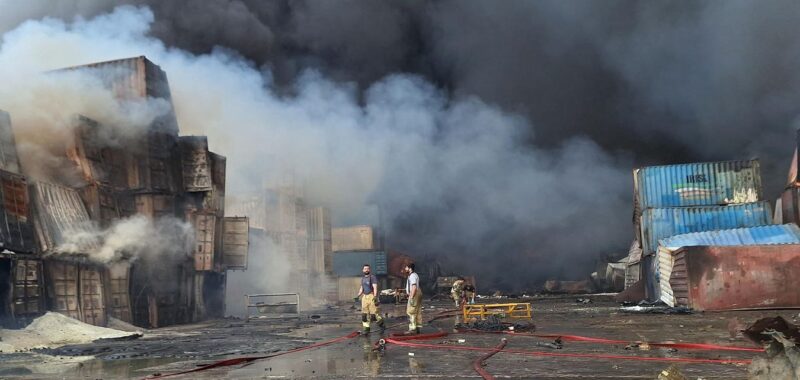TOPSHOT – Firefighters and rescuers work at the scene of an explosion that took place a day earlier … More
The Houthi missile that landed near Israel’s Ben Gurion airport coming soon after the recent explosion at Iran’s strategically critical port near the city of Bandar Abbas may have serious consequences. Israel’s war cabinet has been meeting. All out Iran vs Israel war is not out of the question. Hitherto the Jewish State hasn’t resolved on such a course absent full-blown US backing which previous administrations have withheld. What the US will do as the situation heats up is anyone’s guess, involved as it is currently in deep negotiations with Iran. Even without any escalation, and no matter why it occurred, the port debacle can affect power balances inside Iran.
The picture remains as yet unclear regarding the blast’s cause – some say sabotage, while others claim rocket fuel delivered from China detonated. Here is a report by an Israeli expert discussing the scenarios. In it, the expert argues that the incident, with up to 1000 casualties according to some estimates, is catastrophic for the Tehran regime because the port serves as a lifeline for the IRGC, both economically and militarily. Including, the argument goes, as an exit port for weapons supplies to Iran’s proxies such as the Houthis.
The disaster comes at a highly sensitive moment in negotiations between Iran and the US over the lslamic Republic’s nuclear and military capacity. As such, damage to the port surely has the effect of weakening Iran’s hand in the face-off. Hence the speculations of outside sabotage. But the highly interesting perspective now developing dwells on the domestic repercussions. Anonymous officials have apparently admitted that the explosion was caused by sodium percholate, an essential solid fuel ingredient for Iran’s missiles. Authorities have denied it but the rumor is spreading fast and causing anger among the populace. Since the IRGC is considered a central part of the country’s ruling elite, popular feeling runs high against its insular operations especially if resulting in a catastrophe that harms ordinary civilians (reports of widespread toxic gas effusions also add to the tensions). No surprise, then, if street demonstrations erupt with this as the latest spark.
That, too, one might deduce, weakens Iran’s position in the current negotiations. The regime has no maneuvering room for distraction or postponement of the talks owing to internal unrest since any delay could lead quickly to kinetic action by the Israelis (possibly with US support). All of which could logically result in a weakening of the regime and a possible democratic revolution. After all, the one incontrovertible guarantee it has for keeping power is its nuclear undergirding. Absent that, enforced regime change from without becomes a temptation. But, no, sadly for the people of Iran that seems the least likely outcome.
None of the relevant countries with influence will encourage that eventuality. The last thing Moscow wants is regime change in Iran that might give rise to a strategic realignment. Ditto for China. Both are comfortable, however, with a weakened Iran that does their bidding, offers better deals, and becomes a more suppliant instrument of their regional ambitions. In exchange they will help uphold the regime as they have hitherto. For some time, Moscow has offered and announced civilian nuclear co-operation with Tehran but the authorities there know that giving Russia full control over their nuclear power merely gifts a foreign country dominance over the regime’s fate. At that point, the Kremlin can use Iran as a pawn to make deals with other powers.
In the immediate region, the Turks depend on Tehran as a partner in containing Kurdish nationalism within and beyond their borders. But Turkey also has longterm plans to recreate a Turkic silk road through Azerbaijan out to the Central Asian Stans and Iran is currently the main physical obstacle. For some time, to create a stronger land bridge to Central Asia. Turkey has supported Azerbaijan in gradually projecting influence over their Azeri cousins in the Azeri province of northern Iran, ultimately with a view to inciting secession. That is also why Israel has helped support Baku militarily. Iran without its northern province is a much diminished power with less capacity to project force into the Middle East.
Such are the potential complex geopolitical ripples from the port explosion in Iran. More immediately the military blow to Iran could include damage to its ability to supply the Russia-allied war machine in Ukraine. Any weakening of Iran’s economic, industrial or shipping strength must automatically impair its ability to project power. Not just in supplying missiles to the Houthis but other weapons to proxy militias and Shahed drone parts for use against Ukraine. As things look, Iran is not just diminishing as a regional player but will be lucky to keep its own territory intact over the coming years. Indeed, without the illusions of empire to keep its populace distracted, unable to deliver power and privilege to its elites, internal pressure on the regime will keep mounting. Help from outside allies like Russia and China can keep it whole but for how long?

